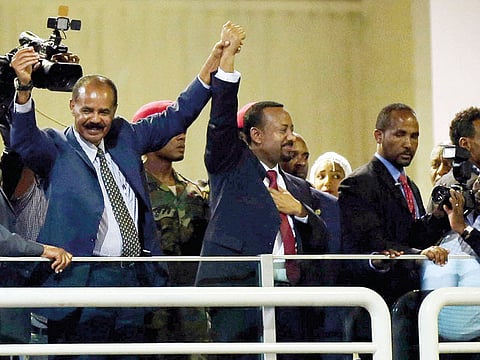Deal shows Saudi, UAE geopolitical importance
Ethiopia-Eritrea accord paves way for stability, prosperity in Horn of Africa

Manama: The momentous rapprochement by Eritrea and Ethiopia in Jeddah on Sunday will not only put an end to a disastrous border conflict that had lasted about two decades, but will also send a strong signal to other countries about the growing importance of Saudi Arabia and the UAE in the region.
The agreement, signed by Eritera’s President Isaias Afwerki and Ethiopia’s Prime Minister of Ethiopia Abiy Ahmad, will also confirm the erosion of Qatari and Iranian influences in the Horn of Africa in favour of the Saudi Arabia and the UAE, termed by Djibouti President Esmail Omar Guelleh as “the pillars of security, peace and stability in the region”.
Thus, the Horn of Africa will become a secure and stable area and Eritrea and Ethiopia will become fertile grounds for huge investments. The region will also distance itself from the scourge of extremism.
The strategy adopted by Saudi Arabia and the UAE in the Horn of Africa had commercial motivations, but it was also aimed at encouraging moderation by isolating Iran and containing the influence of Qatar.
The Jeddah accord indicated that the strategy worked. The role of Saudi Arabia was obvious, while the UAE had a tremendous role behind the scenes, facilitating meetings between Afwerki, Ahmad and UAE leaders on several occasions before and throughout the reconciliations.
Several countries and the Muslim World League applauded the Jeddah agreement as an outstanding opportunity to contribute to the security and stability of the Red Sea, and open the way for more cooperation, trade and investment from the whole world.
“We look forward to Sudan drawing an important lesson from the Jeddah accord and consolidating its relations and cooperation with the Saudi Arabia–UAE axis because it does not have ulterior motives or hidden agendas. Genuine partnerships are needed to ensure prosperity. The closer ties Sudan had with the Muslim Brotherhood and with Iran at the expense of the Gulf countries in the 1990s brought no good to the people,” Idris Ahmad, a Sudanese analyst, said. “No matter how vast or populous a country is, it should ensure peace and stability with its neighbours.”
Since the 1990s, Ethiopia thanks to its vast size, large population and robust economic growth, was able to play a dominant role in the Horn of Africa. But it recently faced domestic instability, including interethnic tensions and widespread protests that resulted in the removal of Hailemariam Desalegn, the 14th prime minister of Ethiopia from 2012 to 2018, from power.
Under Abiy Ahmad, Addis Ababa pursued a two-step policy that included an offensive to control major ports along the Red Sea coast and the Indian Ocean, and exerting diplomatic efforts to encourage deeper economic integration across the region.
Writing for Al Sharq Al Awsat, Gassan Cherbal, a media figure with vast experiences in east Africa, said the countries in the region had long suffered from wars and conflicts on the borders and each state adopted a policy of destabilising its neighbour and hosting its opponents.
“In the midst of these reprisals, the Ethiopian-Eritrean war broke out in 1998 and left more than 100,000 dead. In this cycle of conflict, poverty was deepening, refugee numbers were rising, economies were collapsing, and young people were left with the options of poverty, militias, extremism or the dream of immigration,” he said.
To compound the situation, several countries attempted to take advantage in order to make their presence felt and advance their agendas. Iran sought breakthroughs either directly or through the missiles launched by Al Houthis, he added.
Charbal said it was in this context that the historic Jeddah Agreement could be best understood and the success achieved by Saudi Arabia and the UAE better appreciated.
“Afwerki realised the triumph over poverty, unemployment and technological backwardness was more important than the victory over Ethiopia. From the beginning, Abiy Ahmad considered prosperity to be the key to stability both at home and abroad.”
Sign up for the Daily Briefing
Get the latest news and updates straight to your inbox



